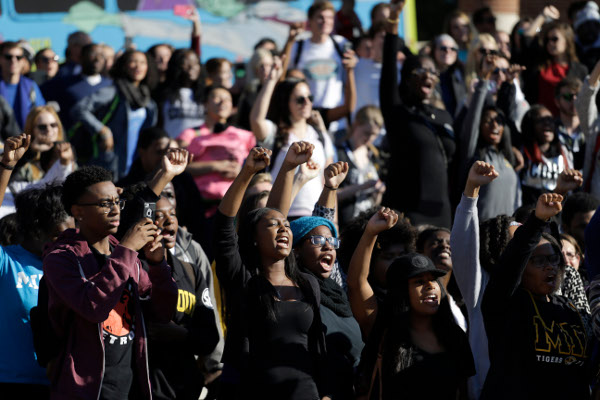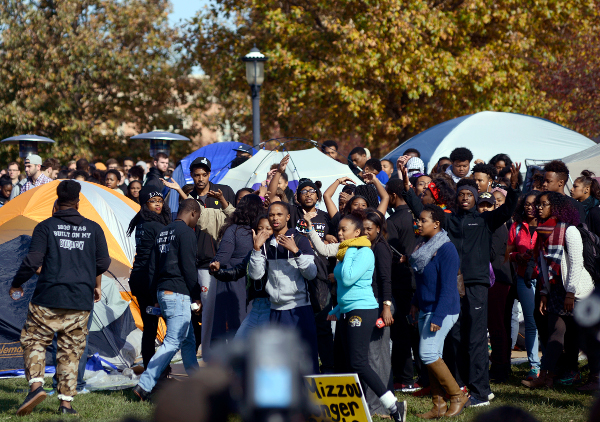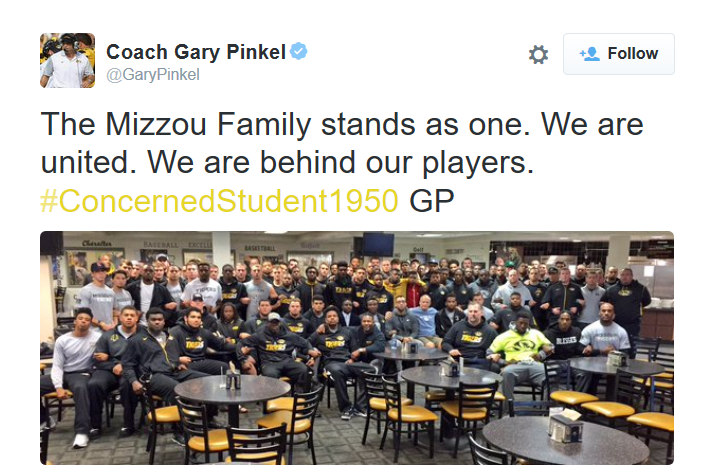Struggle Against Racism at University of Missouri
Students Force President and Chancellor to Step Down
November 10, 2015 | Revolution Newspaper | revcom.us
This is an update on the struggle at the University of Missouri. Also see the original article, included below.
~~~~~~~~~~
Monday, November 9. Students have been demonstrating; grad student Jonathan Butler went on a hunger strike; 32 Black members of the football team went on strike—protesting racist attacks on Black students and the administration repeatedly doing little to address these outrages. (See previous article below.) One of the students’ demands was that Timothy Wolfe, the president of the University of Missouri system, resign or be fired.

Rally following the announcement that University of Missouri System President Tim Wolfe would resign Monday, November 9. (AP photo)
The strong stand of the students inspired others to take a stand against racism. Students of other nationalities joined the protests, there were calls for a student walkout. Sunday night, members of the faculty announced they were would stage a 2-day walkout in solidarity with “the Mizzou student activists who are advocating for racial justice on our campus.” The Missouri Students Association sent a letter to the university system’s Board of Curators demanding Wolfe’s resignation, saying, “Every student’s ability to learn is now affected and threatened by the campus climate.”
Then came news of an important victory for the students: Wolfe announced his resignation. Hours later, the chancellor of the university announced he also was stepping down.
Students, faculty and staff converged on the school quad to link arms, and celebrate the fact that the university had been forced to meet one of their demands.
The football team ended their boycott and Butler tweeted that he had stopped his hunger strike. But the mood on campus is clearly that this fight is far from over! Marshall Allen, a member of Concerned Student 1950, one of the groups that has been organizing protests on campus, said, “This is just a beginning in dismantling systems of oppression in higher education, specifically the UM system.” Butler tweeted, “More change is to come!! #TheStruggleContinues.”
Butler addressed the crowd gathered on Monday, saying, “It should not have taken this much, and it is disgusting and vile that we find ourselves in the place that we do.”
Butler has talked about how he sees this as a fight not just racism but also against sexism and homophobia; and he has pointed to other struggles on campus as well including protests against the school’s decision in August to no longer provide subsidies to help graduate students pay for health insurance; and its announcement in September, following the trend of escalating attacks on women’s right to abortion, to discontinue its relationship with Planned Parenthood.

University of Missouri students celebrate as Jonathan Butler, center, waving, ended his hunger strike Monday, November 9, after Tim Wolfe officially resigned. (Photo: Justin L. Stewart/Columbia Missourian via AP)
In the midst of this struggle, story after story has been coming out of the racist atmosphere on campus that Black students are subjected to—openly having the N-word yelled at them and made to feel less than human. A journalism professor, Cynthia Frisby, wrote in the Missourian newspaper that in her 18 years at the university, “I have been called the N-word too many times to count.”
And other stories have come out like one about a Muslim woman who was called a terrorist and women who have been sexually harassed on campus because they are supposedly wearing outfits that are “asking for it.”
Students are continuing their encampment on the University of Missouri campus.
A letter from student government leaders issued on Monday pointed to the “silence” of university officials after the protests in Ferguson last year against the police murder of Michael Brown. And Jonathan Butler, who had traveled to Ferguson to join the protests, said, “In a post-Ferguson world, there was so much struggle on campus but administration refused to step in on our behalf and do the things they needed to do to make sure black students, brown students and all marginalized students are feeling safe and included on this campus.”
One student, Ayanna Poole, a founding members of Concerned Student 1950 said, “A lot of Mizzou students traveled to Ferguson... [those who didn’t] wanted to stand up and make a change. I do believe it’s been a domino effect.”
Stay tuned to revcom.us as this struggle continues.
University of Missouri: Student Protests, Black Football Player Boycott Against Racism
November 9, 2015 | Revolution Newspaper | revcom.us
FLASH: Monday, November 9, Timothy Wolfe, President of the University of Missouri resigned. See background below.
Anger among Black students at the University of Missouri in Columbia, about racism on campus—which has been simmering has now come to a boil. Students are saying, enough is enough! Students point to a rise in recent incidents where racial slurs have been directed at Black students and administrators have refused to do anything about racism on campus. The University of Missouri-Columbia has student population of 35,000 students, 77% white and 7% Black.
Things started to come to a head back in September. Payton Head, a Black student who is the Missouri Students Association president was walking through campus one night when some guys riding on the back of a pickup started screaming the N word at him. Head wrote on Facebook the next day. “I really just want to know why my simple existence is such a threat to society.” The university’s chancellor didn’t even respond to the incident for a week. Several other Black students had similar experiences on campus and that’s when 25-year-old Jonathan L. Butler, along with other Black students began to organize protests and rallies.
On October 10, Butler and others disrupted the homecoming parade by surrounding the school’s president, Timothy Wolfe, in his red convertible—demanding that administrators do something about the racism on campus. Students say the police threatened to arrest them and used excessive force to disperse protesters.

On October 20, Concerned Student 1950, a group named for the year the university began admitting Black students, released a list of demands protesting the way the university has handled incidents of racism on campus. One of the demands is that Timothy Wolfe either step down or be fired. Wolfe is the president for the Missouri System, which consists of four universities: University of Missouri-Columbia (Mizzou), University of Missouri-St. Louis, Missouri S&T and University of Missouri Kansas City.
After someone drew a swastika on a school wall with feces—and the school didn’t do anything about it, Butler started a hunger strike on Monday, November 2. He released a photo and statement on Facebook uniting with other groups on campus and calling for Wolfe’s removal. Butler is determined to take a stand against what he says have been “a slew of racist, sexist, homophobic, etc., incidents that have dynamically disrupted the learning experience.” Butler said, “I already feel like campus is an unlivable space… So it’s worth sacrificing something of this grave amount, because I’m already not wanted here. I’m already not treated like I’m a human.”
Butler, a candidate for a master’s degree in educational leadership and policy analysis, points to instances where racial slurs have been used against Black students; the removal of graduate student health insurance subsidies; Missouri’s decision to cancel contracts with a local Planned Parenthood clinic, and the swastika drawing. [New York Times, 11-8-15] Butler told CNN, "I'm in this because it's that serious. We're dealing with humanity here. And at this point, we can't afford to continue to work with individuals who just don't care for their constituents.” Butler said he has received messages of support from people across the country and even a group of students in South Korea.
Butler’s strong stand has inspired other students and sparked other protests on campus. White students and students of other nationalities have joined the protests. A group of 36 organizations opposing anti-Semitism sent a letter to the university’s chancellor, protesting the administration’s lack of response to the swastika. These protests have also become a forum for speaking out against homophobia, sexism, and discrimination against LBGT people.
On Saturday, November 7, 32 Black football players announced they were joining the protests, that they would boycott team activities until the president of the university resigns.
On Saturday night, November 7, the Legion of Black Collegians, the Black student government, posted a photo on Twitter of more than 30 football players, linking arms, with a Black graduate student on a hunger strike. One team player tweeted, “The athletes of color on the University of Missouri football team truly believe Injustice Anywhere is a threat to Justice Everywhere. We will no longer participate in any football related activities until President Tim Wolfe resigns or is removed due to his negligence toward marginalized students' experience." Another player tweeted that white teammates were supporting the strike.
It’s not clear what repercussion the football team players will face if they refuse to play in Missouri's next football game against Brigham Young University on November 14. But these students are no doubt courageously taking huge risks stand up against racism. There have been reports of some calling for the students to lose their scholarships. The football team’s coach and the athletic department are supporting the protesting football players. The head football coach Gary Pinkel tweeted a photo of dozens of Black and white members of the football team standing with their arms linked with the message, "The Mizzou Family stands as one. We are united. We are behind our players."
The actions of the athletes reflect a new mood on campuses—60 of the 124 players on the Missouri football roster are Black—many of them starters. And a number of the Black students enrolled at the school come from Ferguson, about 110 miles away, where people rose up after the August 2014 police murder of Michael Brown.
Activism has grown among Black students and others, especially since the upsurge of protests in Ferguson and then nationwide after grand juries let the murderers of Michael Brown and Eric Garner go free. And in response there has been a reactionary, racist backlash at many campuses. There have been news reports of nooses left hanging on trees at Duke University and the University of Mississippi; “Blackface parties” at white fraternities at multiple schools; swastikas have appeared at Yale.
Last year, Jonathan Butler made the two hour drive to Ferguson to join the protests against the murder of Michael Brown. He says, “There was national coverage, so for the school to not cover that or really address that, and we are only two hours away, I think was a huge mistake on their part and contributed to the current cultural environment that we have. It just shows that there are racially motivated things—murders, assaults, other things—that happen and we are just going to sweep them under the rug.”
Volunteers Needed... for revcom.us and Revolution
If you like this article, subscribe, donate to and sustain Revolution newspaper.







